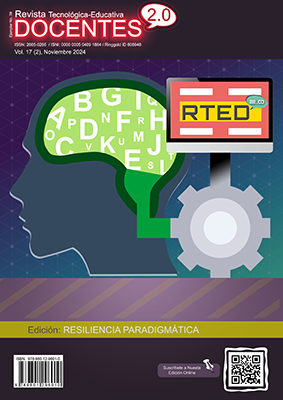Learning Object as Proposal to Improve Academic Performance in Linear Equations in University Students
 DOI:
https://doi.org/10.37843/rted.v17i2.534
DOI:
https://doi.org/10.37843/rted.v17i2.534
Main Article Content
Abstract
Learning Object (LO), which enhances teaching strategies and student autonomy. The objective of this research was to analyze the influence of the design and implementation of the LO on the topic of linear equations of the Logical Reasoning course on the academic performance of the Autonomous University of Carmen students. The research was based on constructivist theory, hypothetical deductive method, positivist paradigm with quantitative approach, quasi-experimental design, and cross-sectional correlational method, with two experimental groups and one control group with pretest-posttest. A non-probabilistic sample was obtained for the convenience of 62 students distributed in the participating groups. Two objective tests of three dimensions and seven indicators were used to evaluate the student's abilities in linear equation instruments to measure academic performance. We were validated with reliability of 0.86 and 0.85 in the pretest-posttest. ANOVA test was applied to check the homogeneity between the groups before the experiment, and no significant statistical differences were observed. The results showed significant statistical differences in academic performance between the experimental and control groups, favoring the groups that used OA. Furthermore, the skills students developed the most when interacting with the LO were using linear equations to solve algebraic problems.
Downloads
Metrics
Article Details

This work is licensed under a Creative Commons Attribution-NonCommercial-NoDerivatives 4.0 International License.
Those authors who have publications in our journal accept the following terms:
- When a work is accepted for publication, the author retains rights of reproduction, distribution of his/her article for exploitation in all countries of the world in the format provided by our magazine and any other magnetic medium, optical, and digital.
- Authors will retain their copyright and guarantee the journal the right first to publish their work, which will be simultaneously subject to the Creative Commons Acknowledgment License (Attribution-NonCommercial-NoDerivatives 4.0 International (CC BY-NC-ND 4.0)). That allows third parties to copy and redistribute the material in any medium or format, under the following conditions: Acknowledgment - You must properly acknowledge authorship, provide a link to the license, and indicate if any changes have been made. You may do so in any reasonable way, but not in a way that suggests you have the licensor's endorsement or receive it for your use. NonCommercial - You may not use the material for a commercial purpose. NoDerivatives - If you remix, transform, or build from the material, you cannot broadcast the modified material. There are no additional restrictions - You cannot apply legal terms or technological measures that legally restrict you from doing what the license allows.
- Authors may adopt other non-exclusive license agreements to distribute the published version of the work (e.g., deposit it in an institutional archive or publish it in a monographic volume) provided that the initial publication in this journal is indicated.
- Authors are allowed and recommended to disseminate their work through the Internet (e.g., in institutional telematic archives, repositories, libraries, or their website), producing exciting exchanges and increasing the published work's citations.
- Request of withdrawal an article has to be done in writing by the author to the Editor, becoming effective after a written response from the Editor. For this purpose, the author or authors will send correspondence via e-mail: [email protected].
- The author will not receive financial compensation for the publication of his work.
- All Docentes 2.0 Journal publications are under the Open Journal System (OJS) platform at: https://ojs.docentes20.com/.
References
Arnau, J. (1995). Fundamentos metodológicos de los diseños experimentales de sujeto único. En M. T. Anguera, J. Arnau, M. Ato, R. Martínez, J. Pascual y G. Vallejo (Eds.), Métodos de investigación en psicología (pp. 179-193). Síntesis.
Colás, M. (1986). Corrientes metodológicas en la investigación educativa. Cuestiones pedagógicas.
Díaz, P. & Díaz, J. (2020). Objeto de aprendizaje como apoyo al docente en la enseñanza del Pensamiento algebraico. En Ariza, Rouquette y Pierdant (Ed.), Resúmenes del 3er Congreso Internacional sobre la didáctica de las matemáticas. Universidad Autónoma Metropolitana, Unidad Xochimilco.
Fallon, G. (2010). Learning objects and the development of students key competencies: A New Zealand school experience. Australasian Journal of Educación Technology. 26(5), 626-642. DOI: https://doi.org/10.14742/ajet.1055
Farji-Brener A.G. (2003). Uso correcto, parcial e incorrecto de los términos "hipótesis" y "predicciones" en ecología. Ecol. Austral 13: 223-227. https://n9.cl/6qfxb7
Hernández, C., Aloiso, A., & Prada, R. (2021). Asociación entre memoria y rendimiento en matemáticas: un estudio correlacional. Boletín Redipe, 10(4), 190-201. https://n9.cl/sdg25 DOI: https://doi.org/10.36260/rbr.v10i4.1262
Hernández Sampieri, R., Fernández, C., & Baptista, P. (2010). Metodología de la investigación (5.ª ed.). McGraw-Hill Interamericana.
Izquierdo, S., Saucedo, M., Díaz, J., & Recio, C. (2017). Análisis de desempeño académico en los alumnos del curso de Razonamiento Lógico del 2013 al 2015 en la UNACAR. Revista Electrónica sobre Tecnología, Educación y Sociedad, 4(7). https://n9.cl/vixwo
Leyva, L. M., Proenza, Y., & Romero, R. (2008). Las áreas de contenido, dominios cognitivos y nivel de desempeño del aprendizaje de la matemática en la educación primaria. Revista Iberoamericana de Educación, 45(1), 1-7. https://doi.org/10.35362/rie4512155 DOI: https://doi.org/10.35362/rie4512155
Novelo, S., Herrera, S., Díaz. J., & Salinas, H. (2015). Temor a las matemáticas: causa y efecto. Revista Iberoamericana de Producción Académica y Gestión Educativa, 2(3). 1-15. https://n9.cl/0jebf
Organista, J. (2010). Análisis del uso de objetos de aprendizaje en las materias de matemáticas y física de bachillerato. Sinéctica, (34), 1-16. https://n9.cl/3inyw0
Orozco, C. (2017). Objetos de aprendizaje con eXeLearning y GeoGebra para la definición y representación geométrica de operaciones con vectores y sus aplicaciones [tesis doctoral], Repositorio de Universidad D Salamanca. https://gredos.usal.es/handle/10366/133003
Pita, S., & Pértegas, S. (2002). Investigación cuantitativa y cualitativa. Cad aten primaria, 9, 76-78. https://n9.cl/9fchr
Quiñones, H. (2018). Práctica Pedagógica Innovadora Apoyada por TIC Fundamentadaen la EPC para trabajar Ecuaciones de Primer Grado con Estudiantes de Noveno Grado en la IED Bossanova [Tesis de Maestría]. Universidad de La Sabana. https://n9.cl/kyjna
Suárez, J. (2014). Factores que generan miedo, apatía o desinterés frente al estudio de las matemáticas. https://n9.cl/iamurh






